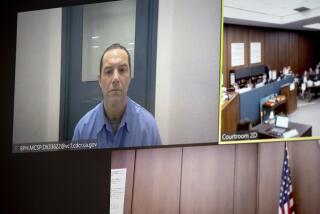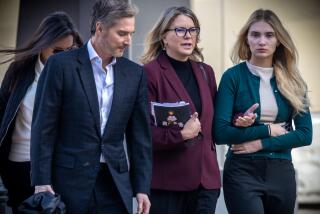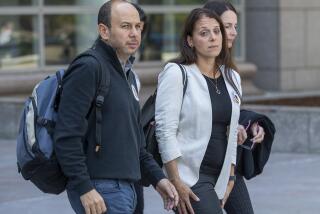Final DNA Tests Point to Simpson, Sources Say : Courts: At least two drops found at crime scene are said to match his blood. Some results are inconclusive.
Final DNA tests in the O.J. Simpson murder case point to Simpson as the source of at least some of the blood drops found near the bodies of Nicole Brown Simpson and Ronald Lyle Goldman, sources close to the case said Wednesday.
Tests still are being conducted by two laboratories, and some of the results so far are inconclusive. But a batch of final results forwarded to defense lawyers and prosecutors this week point to a “match” between Simpson’s blood and that of at least two of the drops found in a line leading away from the bodies, sources said.
Tests for the so-called “genetic fingerprint” could be the most damaging physical evidence to date against the former football great, who has pleaded not guilty to the double murder.
Sources also disclosed Wednesday that a hair found on Goldman is being analyzed to determine whether it matches Simpson’s hair. A match there could for the first time link Simpson to Goldman at the crime scene, a potentially damaging revelation that defense experts might challenge by questioning how only a single hair could end up on Goldman given the furious struggle that authorities believe took place between the two.
Simpson’s lawyers declined to comment. “The judge has directed us not to discuss the scientific evidence, and I’m going to honor that,” said Robert L. Shapiro, one of Simpson’s lead attorneys. Simpson’s lawyers have indicated that they intend to mount an aggressive campaign to discredit the scientific tests, which they say have been marred by sloppy police and scientific work.
The latest disclosures come in the wake of efforts by Los Angeles County Dist. Atty. Gil Garcetti to shore up a potential trouble spot in the prosecution case. Garcetti has called San Francisco Mayor Frank Jordan and another top county official to ask that their medical examiner be allowed to testify as an expert for the prosecution in the upcoming trial.
So far, however, San Francisco officials have refused to release Medical Examiner Boyd Stephens, saying they simply cannot spare him because of budget cuts.
Garcetti approached the San Francisco officials after the Los Angeles County deputy medical examiner who performed the autopsies on Nicole Simpson and Goldman came under furious attack by the former football great’s defense attorneys during a preliminary hearing in July.
Forensic experts say the medical examiner, Irwin L. Golden, at times looked tentative or confused during questioning by Shapiro, who belittled Golden’s credentials. Golden admitted throwing away Nicole Simpson’s stomach contents and failing to closely examine a knife detectives believed was similar to the weapon used in the June 12 murders--lapses that some predict may hurt the prosecution’s case.
“Dr. Golden may be a very nice person, a very amicable person, but he did not on the stand give a feeling of confidence in what he was saying,” said Werner U. Spitz, former Wayne County, Mich., medical examiner and author of a widely used textbook for forensic pathologists. “He did not portray an individual who reasons scientifically and who gives the feeling to a jury . . . that he really knows what he’s talking about.”
Outside the courtroom, Golden’s personal judgment has come under scrutiny as well. A few weeks after his July 8 testimony, police investigated him for allegedly brandishing a gun-like object in the common area of the coroner’s office and shouting threats to lawyers. Police said Golden, who has declined comment, appeared to be joking. He was not charged.
Since then, Garcetti’s office has mounted a concerted campaign to backstop their case by recruiting Stephens as an expert witness. San Francisco’s medical examiner for 23 years, Stephens has testified for the Los Angeles County district attorney’s office before, is a nationally respected forensic pathologist and is the president-elect of the National Assn. of Medical Examiners.
Stephens confirmed that he has been contacted repeatedly by an “intermediary” about the case. Although no specifics were discussed, Stephens said he assumed he would be reviewing the autopsy records and testifying about what forensic evidence says about time of death--a crucial element since Simpson’s lawyers say he was home when the murders took place, preparing for a trip to Chicago that evening.
Stephens said he declined the offer because his office has sustained 25% budget cuts over the last few years, depriving his staff of five positions and forcing him to perform autopsies as well as maintain administrative duties. “I’m not looking for outside work,” he said.
A source familiar with the discussion said that part of the problem is that Stephens believes it would take two months to adequately review the documents for the Los Angeles trial while at the same time running his own office. “They thought he could review the records in one day, prepare another and testify on the third,” the source said.
Stephens’ boss, Chief Administrative Officer Rudy Nothenberg, said earlier this week that Garcetti called him to lobby for the medical examiner’s services, arguing that he needed to bolster the prosecution with an expert witness. But Nothenberg said he had to turn Garcetti down because he was afraid Stephens would become ensnared in the trial.
“Your district attorney suggested it would not be long but I’m afraid it would be an extensive commitment,” said Nothenberg. “While I’m sure Mr. Garcetti is a man of his word, there’s no telling how long the defense would keep him (Stephens) on the stand.”
On Wednesday, Jordan spokesman Noah Griffin also confirmed that Garcetti called the mayor last week about springing Stephens.
“The presumption was that the result of the coroner’s work down there wasn’t satisfactory and they wanted someone with (Stephens’) experience to freshly review what was done,” said Griffin. “But at this point, we’re just unable to spare him. We face $600-million worth of projected budget deficits in the Jordan Administration. . . . He’s overworked and understaffed.”
A spokeswoman for Garcetti said Wednesday it is not unusual for the office to use expert witnesses, but declined to comment on his phone calls or outline the normal procedure for requesting help from other jurisdictions. A coroner’s spokesman also declined comment.
It was unclear whether Stephens would be a substitute prosecution witness for Golden or be called as an expert to bolster the coroner’s testimony.
Jury selection in the case is scheduled to begin Sept. 26.
In another development Wednesday, Simpson’s lawyers filed papers opposing a prosecution request to have jurors in the case fully sequestered from the time the trial starts until it ends to shield them from what is expected to be one of the most publicized criminal trials in recent history.
The reasons for the defense opposition to the sequestration were not known because the papers were filed under seal.
Under the sequestration order sought by the prosecution, the jurors would be put up in hotels at night and not allowed to have contact with anyone except court bailiffs. Only Superior Court Judge Lance A. Ito could make exceptions.
Legal experts said one of the reasons defense lawyers might oppose the sequestration is that they may be afraid that a panel of jurors who could give up months of their lives and be away from their families and friends for that long would not reflect the diversity of Los Angeles’ population.
Such jurors would typically be older and wealthier, the experts said.
Also on Wednesday, Simpson’s lawyers filed more papers in support of their attempt to get Ito to suppress virtually all of the evidence police took from O.J. Simpson’s home and automobiles.
The evidence the defense wants to suppress includes items police took in two searches of Simpson’s business office on San Vicente Boulevard, the most recent of which was Sept. 2.
Those searches were in connection with a grand jury inquiry into whether Al Cowlings tried to help the football great flee from police before his arrest. But the defense in its papers insisted police really were looking for evidence against Simpson.
The defense lawyers do not yet know what police took in the office searches, they said, because they have not received the search warrant affidavits and property lists connected with them.
The papers filed Friday list many items that already have been made public, including a right-handed, bloody glove a police detective testified he found at Simpson’s estate. The court papers also for the first time describe some items taken from Simpson’s Ford Bronco that are being held by police as evidence. They include a note pad and a note with “Nicole” written on them, music tapes, business cards and a tape of the Al Pacino movie “Carlito’s Way.”
Times staff writer Andrea Ford contributed to this report.
More to Read
Sign up for Essential California
The most important California stories and recommendations in your inbox every morning.
You may occasionally receive promotional content from the Los Angeles Times.











